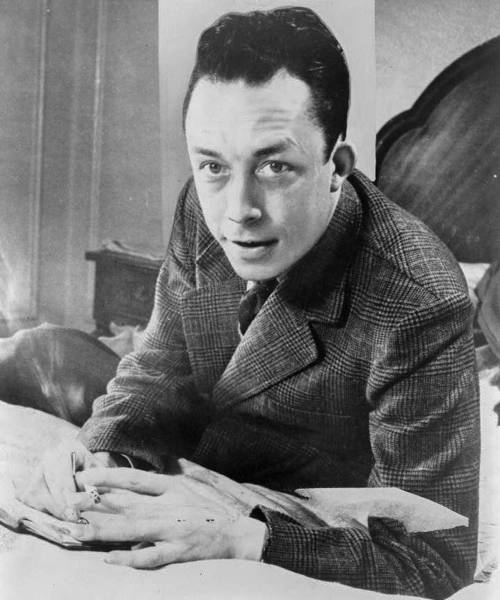
FAQ About Albert Camus

Who was Albert Camus?
Albert Camus was a French philosopher, author, and journalist, born on November 7, 1913, in Mondovi, French Algeria. He is best known for his works in existentialism and absurdism, contributing significantly to 20th-century philosophy and literature. Some of his notable works include 'The Stranger', 'The Myth of Sisyphus', and 'The Plague'. Camus received the Nobel Prize in Literature in 1957 for his contributions to writing that illuminates human consciousness and morality.

What is the central theme of 'The Stranger' by Albert Camus?
The central theme of 'The Stranger', a novel by Albert Camus, is the absurdity of human life. The protagonist, Meursault, experiences life from a detached perspective, highlighting how societal norms and moral codes are often arbitrary and meaningless. The novel explores existential themes such as the irrationality of the universe and the insignificance of human existence in the broader sense.

What philosophical movement is Albert Camus associated with?
Albert Camus is primarily associated with the philosophical movement known as absurdism. While often linked with existentialism, Camus himself distanced his work from traditional existential philosophy, focusing instead on the absurd, which underscores the conflict between humans' desire for order and meaning and the indifferent, chaotic universe. His works explore themes around the individual's struggle with the inherent lack of meaning in the world.

What are some major works by Albert Camus?
Some of Albert Camus' major works include 'The Stranger' (1942), 'The Myth of Sisyphus' (1942), 'The Plague' (1947), 'The Fall' (1956), and 'The Rebel' (1951). These works explore themes of absurdism, existentialism, and the human condition, reflecting Camus's philosophical inquiries and literary style. Camus also wrote plays such as 'Caligula' and 'The Misunderstanding'.

What is 'The Myth of Sisyphus' about?
'The Myth of Sisyphus' is an influential philosophical essay by Albert Camus that explores the concept of the absurd. In this essay, Camus employs the Greek myth of Sisyphus, who is condemned to roll a boulder up a hill only for it to roll back down each time he reaches the top. Camus uses this myth to illustrate the futility of human endeavors and argues that one must imagine Sisyphus happy, finding meaning through the struggle itself, despite life's inherent absurdity.

Why did Albert Camus win the Nobel Prize in Literature?
Albert Camus was awarded the Nobel Prize in Literature in 1957. The Nobel Committee awarded him for his work that sheds light on the human conscience and the moral problems of the age. His writings, characterized by a rich blend of philosophical and literary exploration, delve into themes such as absurdism and existentialism, resonating deeply with readers around the world for their profound inquiry into the human condition. He was the second youngest recipient of the literature prize at that time.

What is absurdism according to Albert Camus?
According to Albert Camus, absurdism is a philosophical perspective that highlights the inherent conflict between the human tendency to seek inherent value and meaning in life and the indifferent, purposeless universe. Camus views life as devoid of objective meaning, encouraging individuals instead to embrace life itself and the freedom that comes with acknowledging this absurdity. His essay 'The Myth of Sisyphus' describes how one might confront the absurd by accepting it and living with purpose regardless of life’s intrinsic meaninglessness.

How does 'The Plague' reflect Camus's philosophical views?
'The Plague' is a novel that reflects Albert Camus’s philosophical views on absurdism and the human condition. Set in the Algerian city of Oran, it recounts an outbreak of plague and the collective and individual responses to this crisis. The novel can be interpreted as an allegory for the human response to the absurd—a reminder of life's unpredictable and often meaningless nature. Through its characters, the story showcases resilience, solidarity, and ethical commitment in the face of despair, reflecting Camus's belief in finding meaning through personal resolve and communal responsibility.

Was Albert Camus involved in politics?
Yes, Albert Camus was deeply involved in political issues of his time. He was an outspoken critic of totalitarianism and was involved with several political causes. This included his involvement in the French Resistance during World War II, as well as his criticism of Soviet Communism and his nuanced position on the Algerian War of Independence. Camus often used his role as a journalist and writer to express his opinions on political and ethical issues.

Did Albert Camus consider himself an existentialist?
No, Albert Camus did not consider himself an existentialist, despite frequent associations with this philosophical movement. While his works tackle existential themes, Camus preferred to align with absurdism, focusing on the conflict between humans' quest for meaning and the silent, meaningless cosmos. He respected existentialist thinkers but maintained a distinct philosophical identity, emphasizing that his work represented absurdism rather than traditional existentialist thought.

What impact did Albert Camus's upbringing have on his works?
Albert Camus's upbringing in Algeria as part of a poor, working-class family had a significant impact on his works. His early experiences in a colonial setting imbued him with a sense of social justice and awareness of inequality, themes that permeate his writing. The Algerian landscape and his French-Algerian identity also influenced the settings and cultural dynamics in his stories, contributing to the depth and realism found in his novels and essays.

How did Albert Camus die?
Albert Camus died in a car accident on January 4, 1960, at the age of 46. He was traveling with his publisher Michel Gallimard when their car crashed near the town of Villeblevin, France. It was a sudden and tragic end to his life, cutting short the career of one of the most influential literary and philosophical figures of the 20th century.

What influence did Albert Camus have on 20th-century literature and philosophy?
Albert Camus had a profound influence on both 20th-century literature and philosophy. His exploration of absurdism challenged traditional perspectives on meaning and existence, resonating with a post-war generation grappling with issues of adversity and moral ambiguity. Camus's lucid prose and philosophical depth enriched modern thought, inspiring countless writers and philosophers. His focus on the human condition, morality, and the struggle for meaning continue to impact contemporary discussions and literary styles.

What is Albert Camus's connection to the concept of 'The Absurd'?
Albert Camus is intrinsically linked to the concept of 'The Absurd', which forms the cornerstone of his philosophical ideology. Camus introduced 'The Absurd' as a fundamental clash between human desires for order and meaning and the universe's indifferent, chaotic nature. His works, including 'The Myth of Sisyphus', provide insight into navigating life while acknowledging this absurdity, encouraging acceptance and engagement rather than despair. Camus's perspective on absurdism has significantly influenced existential and absurdist philosophies.

Which book by Albert Camus discusses the philosophy of absurdism?
'The Myth of Sisyphus', a philosophical essay by Albert Camus, is the principal text discussing his philosophy of absurdism. In this seminal work, Camus uses the legend of Sisyphus as a metaphor for the human quest to find meaning in a purposeless world. He explores strategies for confronting the absurd, advocating for a life lived fully with awareness rather than succumbing to despair or escapism.

How did Albert Camus approach existential questions in his works?
Albert Camus approached existential questions by dissecting the human desire for meaning and confronting the reality of an indifferent universe. Rather than providing solutions, Camus's works pose questions about existence, freedom, and morality. His focus on absurdity as a condition of life provides a lens through which characters navigate crises and ethical dilemmas. Through this exploration, his writings challenge readers to confront existential uncertainty with courage and personal resolve.

What was Albert Camus's philosophy on rebellion?
Albert Camus's philosophy on rebellion is extensively discussed in his work 'The Rebel'. He views rebellion as an essential human reaction against oppression, injustice, and the absurd nature of existence. Camus advocates that rebellion stems from a desire to affirm one's individuality and demand justice and meaning. However, he also stresses the importance of maintaining moral integrity and compassion in the struggle against dehumanization and tyranny.

How does 'The Fall' reflect Albert Camus's existential themes?
'The Fall', a novel by Albert Camus, delves into existential themes through the confessional narrative of its protagonist, Jean-Baptiste Clamence. As he reflects on his life and failures, Clamence reveals insights into guilt, freedom, and the nature of human judgment. The novel uses his self-examination to explore existential motifs like the search for meaning, authenticity, and the intricate dynamics of self-reflection and societal perception. It encapsulates Camus's exploration of existential dilemmas through personal narrative.

What is the setting of Albert Camus's novel 'The Plague'?
The setting of Albert Camus's novel 'The Plague' is the city of Oran in Algeria. Oran becomes the epicenter of a deadly plague, and the novel describes the city's struggle with quarantine, social upheaval, and human suffering. Through this setting, Camus explores themes of isolation, resistance, and solidarity, using the backdrop of a biological crisis to reflect on broader existential and absurdist themes inherent in human life.

Can you name any plays written by Albert Camus?
Yes, Albert Camus wrote several plays. Some of his notable plays include 'Caligula', 'The Misunderstanding' ('Le Malentendu'), and 'State of Siege' ('L'Etat de Siège'). Like his novels and philosophical essays, these plays often explore themes related to absurdism, existentialism, and the human condition, providing a theatrical medium through which Camus examines moral and philosophical questions.
